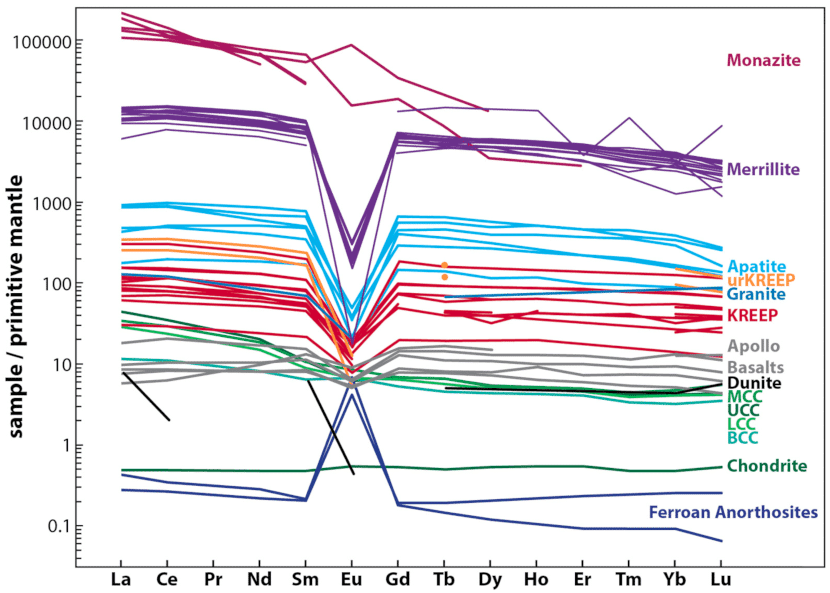
The rare condition does not refer to the amount of mineral available. Talk about the possibility of finding them in their purest form
China has a weapon to respond to the blockade against Huawei. And it is a weapon of mass destruction. The Asian country could cut off the supply of critical materials. We refer to materials that areThey are necessary for large sectors of the US economy.
Last week, Chinese media began to speculate on what the responses to the sanctions against Huawei could be. Given that these are state-owned media, their speculations appear to be well founded. One of the measures mentioned is the prohibition of exports of rare earth elements to the United States.
What are rare earth elements?
Expression Rare earths refers to elements that are not usually found in pure form. The term "earth" refers to something that can be dissolved in acid. It is made up of chemical elements such as scandium, yttrium and the 15 elements of the lanthanide group (lanthanum, cerium, praseodymium, neodymium, promethium, samarium, europium, gadolinium, terbium, dysprosium, holmium, erbium, thulium, ytterbium and lutetium)
Why do we say that China has a weapon?
Because These are essential minerals for certain sectors of the US economy.
China supplies about 80 percent of the rare earth elements imported by the United States, which are used in oil refining, batteries, consumer electronics, defense and others.
Oil refineries depend on rare earth imports. They use them as catalysts to convert crude oil into gasoline and jet fuel. Permanent magnets use four different rare earth elements to varying degrees. And they, like God, are everywhere. Including headphones, wind turbines, and electric cars.
According to a consultant specializing in strategic markets, the Chinese embargo:
It would affect everything: cars, renewable energy, defense and technology.
In other words, Huawei would not have Google Play, but the US would not have batteries, new cell phones, gasoline, electric cars. Or I would have them at much more expensive prices.
Okay, China has a weapon. Would you dare to use it?
China has already used its dominant position in rare earths to force negotiations. In 2010, it drastically limited rare earth exports to Japan. It was during disputes over some islands. Although the embargo did win some victories for China. Although, lleHe went to other countries to reevaluate and reduce their dependence on critical materials that Beijing controls.
Some don't believe China does.
A Japanese energy policy analyst claimed.
One of the consequences of the embargo on Japan is that China's reputation as a stable producer suffered.
I would be surprised if there was an outright embargo. It would be a drastic measure that would sound the permanent alarm in global national security circles. And just to achieve a small goal that he could apply other tools to, or even wait, given Trump's fickleness.
If China made the decision, pIt would harm large sectors of the US economy, although the exact magnitude of its implementation is difficult to estimate. The mere threat of China preventing the supply of critical industrial materials reveals enormous vulnerabilities. The issue is already a matter of concern among analysts and policy makers in Washington, London, Bonn and other Western capitals.
The end of an era?
From the fall of the USSR, appeared globalized supply chains prevailed because they offer flexibility and lower costs for consumers of a wide range of products.
After the Second World War, the central position of the US dollar and its financial system fostered trade and fueled growth. However, the current geopolitical tension makes these advantages turn into vulnerabilities.
In circumstances like this it is becoming more and more necessary to spread the principles of open source in software and hardware. It must also be extended to other sectors such as scientific research and drug production.
The truth is that those of us who thought we had left the cold war behind in 89 were wrong. We are at the door of a new one. Although it seems that without nuclear weapons.
“In circumstances like this, it becomes increasingly necessary to spread the principles of open source in software and hardware. It must also be extended to other sectors such as scientific research and drug production. "
Excellent reflection!
I don't think the paragraph makes a lot of sense, except when it comes to scientific research. The hardware, whether free or proprietary, also depends on those rare earths (and, as far as I know, software depends on having hardware to work), which also have their influence in the pharmaceutical industry.
The only possible hope is in scientific research, which allows finding alternatives to these rare earths. The rest of the list is as if talking about electric cars: No rare earths -> No electric cars.
The paragraph is related to the immediately preceding one
China does not have a monopoly on rare earths, its advantage is cheap labor and a lack of environmental laws.
When I wrote the paragraph I was thinking more about Google and the United States monopoly on the Internet
Such news highlights that Huawei's "plan B" is a bluff ... with which I had been excited ... but let's be patient with the Chinese to see if they surprise us.